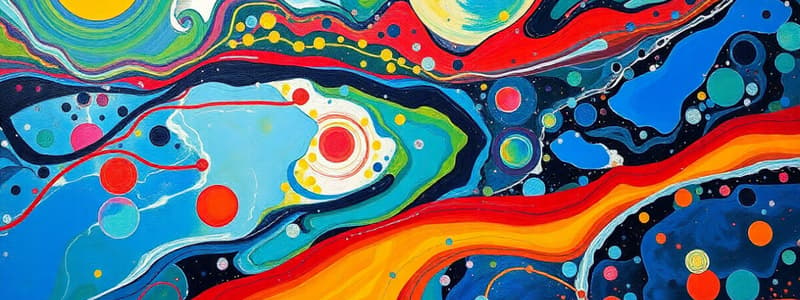Podcast
Questions and Answers
What was the believed origin of human beings according to the content?
What was the believed origin of human beings according to the content?
- From apeiron
- From atoms
- From liquid air
- From the meeting of sperm and egg (correct)
What philosophy problem did he focus on?
What philosophy problem did he focus on?
- The existence of God
- The nature of time
- The relationship between the finite and infinite
- The problem of the one and the many (correct)
According to the content, how did he understand change?
According to the content, how did he understand change?
- Change is a result of human perception
- Change can be measured
- Change is inevitable and constant
- Change is an illusion (correct)
Which elements did he consider as the origin of everything?
Which elements did he consider as the origin of everything?
What did he claim to be the first principle of everything?
What did he claim to be the first principle of everything?
What term did he invent?
What term did he invent?
How did he perceive the relationship between numbers and everything that exists?
How did he perceive the relationship between numbers and everything that exists?
What conclusion did he reach about the existence of God?
What conclusion did he reach about the existence of God?
What did he imply regarding the nature of reality?
What did he imply regarding the nature of reality?
What did he consider to be the starting point of human existence?
What did he consider to be the starting point of human existence?
How did he perceive the concept of change?
How did he perceive the concept of change?
Which of the following did he list as the elements that constitute the origin of everything?
Which of the following did he list as the elements that constitute the origin of everything?
What philosophical problem did he primarily engage with?
What philosophical problem did he primarily engage with?
What did he assert about the nature of reality and its composition?
What did he assert about the nature of reality and its composition?
In his view, what must be considered the first principle of everything?
In his view, what must be considered the first principle of everything?
What crucial question did he raise about the apeiron?
What crucial question did he raise about the apeiron?
What was his stance on the existence of God in relation to atoms?
What was his stance on the existence of God in relation to atoms?
Which of the following terms was he credited with inventing?
Which of the following terms was he credited with inventing?
Flashcards are hidden until you start studying
Study Notes
Origin of Humanity and Philosophy
- Human beings originate from the combination of sperm and egg, marking the beginning of the human person in a liquid form.
- Everything is believed to have originated from water, a central element in ancient philosophical thought.
- Considered the Father of Philosophy due to his foundational ideas on existence and the nature of the universe.
Concept of Apeiron
- The term apeiron refers to a boundless or infinite principle from which everything emerges.
- Raises the question of how knowledge of the apeiron is obtained if all derives from it.
The Elemental Basis of Existence
- Water forms ultimately transition into air, suggesting that all things originate from air.
- Emphasizes the problem of change, proposing that “There is no change” and that change is merely an illusion created by human senses.
Fundamental Elements
- Proposes that water, air, fire, and earth are the core origins of everything.
- Contributes to the ongoing discussion on creation and existence by recognizing a collective idea of everything.
Importance of Numbers and Atoms
- Introduces the concept that everything can be quantified, with numbers serving as a primary principle of existence.
- First philosopher to coin the term "philosophy," establishing a foundational terminology.
- Proposes that all matter, including divine entities, is composed of atoms, aligning with the idea of atoms as a fundamental principle of reality.
Democritus' Views
- Democritus expands on atomic theory, suggesting that even God, if he exists, would also be made of atoms, reflecting a materialistic view of the universe.
Origin of Humanity and Philosophy
- Human beings originate from the combination of sperm and egg, marking the beginning of the human person in a liquid form.
- Everything is believed to have originated from water, a central element in ancient philosophical thought.
- Considered the Father of Philosophy due to his foundational ideas on existence and the nature of the universe.
Concept of Apeiron
- The term apeiron refers to a boundless or infinite principle from which everything emerges.
- Raises the question of how knowledge of the apeiron is obtained if all derives from it.
The Elemental Basis of Existence
- Water forms ultimately transition into air, suggesting that all things originate from air.
- Emphasizes the problem of change, proposing that “There is no change” and that change is merely an illusion created by human senses.
Fundamental Elements
- Proposes that water, air, fire, and earth are the core origins of everything.
- Contributes to the ongoing discussion on creation and existence by recognizing a collective idea of everything.
Importance of Numbers and Atoms
- Introduces the concept that everything can be quantified, with numbers serving as a primary principle of existence.
- First philosopher to coin the term "philosophy," establishing a foundational terminology.
- Proposes that all matter, including divine entities, is composed of atoms, aligning with the idea of atoms as a fundamental principle of reality.
Democritus' Views
- Democritus expands on atomic theory, suggesting that even God, if he exists, would also be made of atoms, reflecting a materialistic view of the universe.
Studying That Suits You
Use AI to generate personalized quizzes and flashcards to suit your learning preferences.




